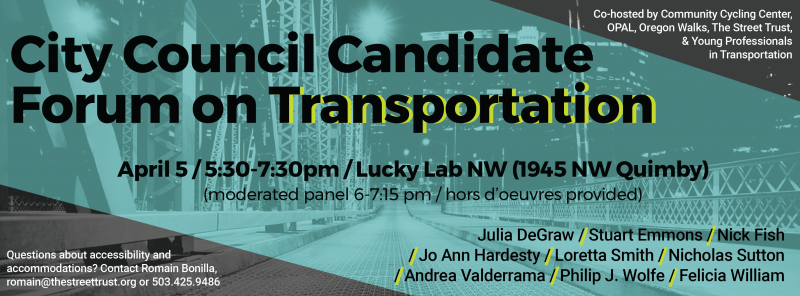
Tonight is when many of us will hear what a new crop of Portland City candidates think about transportation for the very first time.
Before we all head over to the Forum on Transportation co-hosted by Community Cycling Center, OPAL Environmental Justice Oregon, Oregon Walks, The Street Trust, and YPT Portland (Young Professionals in Transportation), I wanted to at least give you a hint of where each candidate is coming from.
For this post, I’ve shared a tiny bit of personal background for each candidate and as much of their transportation policy positions I could find on their websites. Some candidates don’t even list mention transportation in their platform. That itself is worth noting. Also please note that I understand how transportation is related to issues like police accountability and housing, but for this post I’ve chosen to only focus on positions that directly address transportation.
Consider this a primer before you attend tonight’s event!
(Note: Candidates are listed in the order they appear on the City of Portland’s official registry.)
City Council Seat No. 2 (Currently held by Nick Fish)
Nick Fish – website
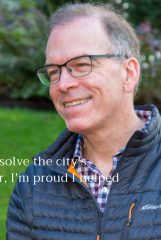
Fish has been a member of City Council for 10 years now so he’s by far the most well-known quantity of this bunch.
Here’s what he shares about transportation on his website:
Nick is passionate about making our streets and sidewalks safer for everyone, especially east of 82nd Avenue.
Nick consistently advocates for Vision Zero and new safety investments for East Portland’s most dangerous streets, including outer Southeast Powell.
Nick’s bureaus are partnering with the Portland Bureau of Transportation and Venture Portland to reduce the impact of construction projects on neighborhood businesses.
Nick encourages new ideas – like “Better Naito” – to improve safety for all road users.
Nick supported expanding our active transportation network through Bikeshare and the Bike Master Plan.
Nick supports investments to fix potholes and update our transportation infrastructure – because better streets are safer streets.
Nick is a strong supporter of the City’s policy dedicating half of its surplus each fall to infrastructure maintenance.
Nick voted to refer a temporary gas tax to the ballot – it passed, and will fund major investments in basic road repair and new bike infrastructure.
Nick endorsed the City’s successful effort to secure state funding for pedestrian improvements along Columbia Boulevard.
Julia DeGraw – website

DeGraw is a community organizer with a background in environmental justice work. She lives east of 82nd Avenue and makes that fact a central pillar of her pitch, saying this election, “Means being part of a real shift in City Hall.”
DeGraw’s transportation ideas are presented with the framing of “No neighborhood left behind.”
And not surprisingly, she puts a strong emphasis on places east of 82nd Avenue.”As a resident living east of 82nd Avenue,” she writes. “I experience daily our community’s few sidewalks, inadequate lighting, unpaved roads, poor transit options, and dangerous streets for pedestrians and cyclists.”
She outlines three transportation policy priorities:
Dedicated bus lanes
Dedicated bus lanes will decrease wait times and get buses out from behind automobile traffic.Local control of East 82nd Avenue and Powell Blvd
Major arteries can be death traps for pedestrians and cyclists. Let’s transfer control of state-run Powell Boulevard and 82nd Avenue to city authority, so we can pool city and state budgets and make necessary improvements such as sidewalks and crosswalks.Transit bonds that won’t drive displacement
Better transit doesn’t have to be the harbinger of more displacement and gentrification. Transit bonds should include funds and regulations which prevent current residents from being displaced.
Nicholas Sutton – website (Facebook)
Sutton is the biggest unknown in the field. He doesn’t have a campaign website and his Facebook page includes very little information. He did however, post something about transportation on March 23rd.
The city of Portland is facing a problem, with exponential growth comes the need for better transportation solutions, but “more freeways” and “more roads” is a tiresome and unoriginal patch to a problem and far from a solution. Trimet has become a limbering juggernaut from a bigone era, which has brought nothing new or innovative for the better part of 20 years.
The Portland I grew up in was innovative and fresh, and threw itself at new challenges face first.
So in that spirit, I’d like to hear some ideas that don’t involve more roads for more cars, and are more than just “more busses.”
How do we confront traffic congestion, dependence on fossil fuels, and the growing need for parking with new ideas! I want to hear from you, regardless of how simple or outlandish the idea might be, regardless of whether you’re from Portland or Mount Olympus.
Rainbow bridge? Jetpacks? Rocketpowered escalators? Monorails and Bullet trains? Throw whatever you got my way, I wanna hear it.Winner will get my eternal undying love and devotion and a free trip to hell curteosy of my satanic socialist agenda!
Philip J. Wolfe – website
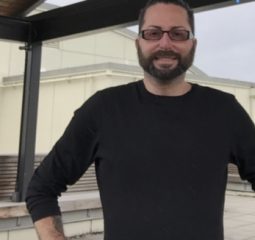
Wolfe has an amazing life story. Given up to his grandparents by his “rock star wannabe” mom and ultimately adopted, he’s been deaf since infancy and grew up in rural upstate New York. His biological mother died in a car crash after being hit by a drunk driver when he was 16. He’s lived and visited many cities across the country and moved to Portland from Seattle. Wolfe is currently an active member of the Portland Commission on Disability
“Traffic Reform” is one of five issues he lists as goals on his campaign website:
Traffic Reform
According to the TomTom Traffic Index, Portland has become one of the top ten cities in the nation with the most traffic congestion. With our ever-growing population, issues abound with inadequate public transportation and commuting options for drivers. Our current infrastructure does not support the hundreds of thousands of cars on the roads, and there are many necessary repairs needed to restore bridges and highways. The current City Council proposal does not reduce carbon emissions, focuses on unrealistic highway expansion and minimal street repairs for a total of 450 million dollars. In other growing cities such as Los Angeles, Seattle, etc., it has been statistically and historically proven to increase one-person driver vehicles and has been unsuccessful in eliminating or decreasing traffic congestion.
How can we create a city that is more green, provides excellent public transportation and also has a budget for maintaining sustainable city infrastructure? Well, I believe the answer lies in redesigning how we get around our city. With the proposed highway project of 450 million dollars solely designed for a few street repairs and minimal expansion, I firmly believe these funds be invested in creating more modes of public transit and a complete overhaul of downtown. I propose that downtown Portland become a pedestrian, public transportation and biking area only with well built and easily accessible parking lots for car commuters. I propose that we design a subway or light rail system in addition to this as it would reduce carbon emissions, be built with earthquake technology and increase foot traffic to the local business. These few projects would total to less than 450million dollars which would leave a surplus to repair already degraded bridges and streets.
It’s time for us to show the world that here in Portland we genuinely care about the people and our environment, known as our Mother Earth. We, the people, deserve the best air quality and transportation options. Join me and let us revolutionize our approach to traffic and create a better Portland for everyone.
I believe together we can achieve success such as:
– Approve funds to invest in traffic infrastructure reform to expand public transportation options and decrease dependence on our congested highways/freeways
– In-depth analysis and funding projections for building and maintaining urban Sky Trams and Aerial Trams
– Mandate all Tri-Met transportation display captions and voice announcements at each stop for people with disabilities’ population
– Install more Park n’ Ride sites for car commuters while stop adding new parking lot buildings
– Start collecting data on traffic so we can track what to expect in the near future with growing number of people using traffic
City Council Seat No. 3 (Currently held by Dan Saltzman)
Jo Ann Hardesty – website
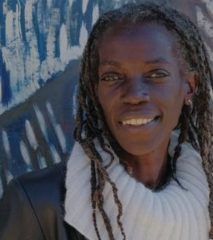
Hardesty is currently the president of the Portland branch of the NAACP. She has many years of experience as a former Oregon State Representative and has worked as a leader and/or board member with many advocacy groups including: Coalition for Livable Future, Portland Community Media, Albina Ministerial Alliance, City Club of Portland, and others.
While she does have experience working on climate change and environmental justice issues, Hardesty does not have a section on her site that directly addresses transportation issues. Her “One Portland, One Planet” platform does include a pledge to, “Reduce harmful emissions, particularly greenhouse gases.”
Felicia Williams – website

Williams has a varied background that includes a five-year stint in the U.S. Air Force and work on civil rights. She’s a graduate of University of Portland and Portland State. She’s currently president of the Downtown Neighborhood Association.
She’s the only candidate in the race that puts a bicycle front-and-center. You can see one in her logo and she’s walking alongside a bicycle in the lead photo on her website. However, her platform doesn’t have a plank for transportation.
Andrea Valderrama – website
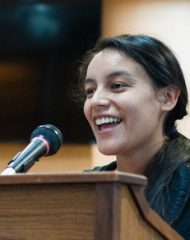
Valderrama was born in Peru and came to America with her parents. Her grandparents were day laborers and she grew up without a father. Valderrama says she put herself through college (she has a degree from University of Oregon) by cleaning houses afterschool. She lives in the Hazelwood neighborhood of east Portland.
A two-term member of the David Douglas School Board, Valderrama currently works for the City of Portland as senior policy advisory for Mayor Ted Wheeler. Prior to that she was a policy and outreach advisor for City Commissioner Steve Novick and she focuses specifically on east Portland. Since Novick was PBOT Commissioner, Valderrama gained experience working on transportation issues.
I was unable to find a transportation platform on her website. UPDATE: After this story published, Valderrama updated her site with a listing of her transportation priorities:
– Commitment to Vision Zero and Increased Transportation Options to Eliminate Traffic-Related Deaths
– Congestion Pricing to Reduce Traffic Jams
– Safe Routes to School
– Youth Pass
– Investment in Mass Transit and Pedestrian / Bicycle infrastructure, Leading to Decreased Carbon Emissions and Livable, Walkable Neighborhoods
Loretta Smith – website
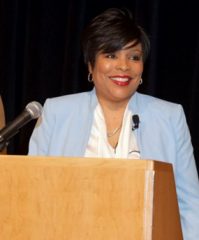
Smith currently serves as a Multnomah County Commissioner, a post she’s held for seven years. She’s from northeast Portland, a product of local public schools, and an Oregon State graduate.
Here’s what Smith says about transportation on her “Priorities” page:
Providing An Effective And Equitable Transportation System
As people have been moving to the area, we have not kept up our transportation system to meet the growing demand. Congestion has a serious drag on the local economy and our quality of life. The lack of adequate safety features on our streets, particularly in East Portland, is putting the public at risk. We must be doing more to support public transit, bicycling, walking, and other options to meet people’s transportation needs. We must also address the backlog of maintenance that, if unaddressed threatens to become a serious drain on resources.
Loretta supports moving forward with the Rose Quarter project to eliminate that major bottleneck, as well as the efforts to improve the Powell and Southwest Corridors. The City must also step up its work to find the funding to finally pave and complete other safety improvements in long neglected East Portland – we promised these neighborhoods they would receive these services when they joined the City and the work has never been completed. We need to recognize that not every Portlander can rely on a car for their personal transportation needs and they deserve effective ways to get around the city. And the city must get serious about finding the necessary funding to reduce the backlog of deferred maintenance of our streets – looking at redirecting available city dollars and partnering with other governments in the region to up our investment in transportation infrastructure.
Loretta also supports efforts to reduce inequities facing low-income, communities of color, and transit-dependent Portlanders. That is why she fully supports efforts to create a TriMet low-income fare and supports a free student pass for all high school students in Portland.
Stuart Emmons – website
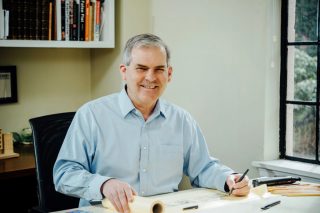
Emmons is an architect whose campaign thus far has focused primarily around his ideas for addressing Portland’s homelessness and housing affordability crisis. In 2016 he came in an unexpected third place in the election that Chloe Eudaly won over Steve Novick.
The page on his site that offers his ideas on transportation includes a photo of a bike lane in Copenhagen. Here’s what else it says:
Let’s assume that population projections for Portland in the next 20 years are even close to accurate. And let’s add in that our freeways are already packed and no freeways will ever likely be constructed. For those reasons alone, we need to make much more headway on bikes, mass transit and any alternative transportation methods that may evolve (like autonomous and electric vehicles).
And then there is our enviable quality of life, climate change and the quality of our air to consider. This calls for not only no increase in car trips, but also a reduction in car trips.
We need to expand our bike infrastructure to make biking safer, faster and more convenient. Dedicated bike lanes, safe crossings, bike parking, and no dangerous potholes and grates on bike routes.
We need to keep expanding mass transit. It needs to be faster, and it needs to be more far-reaching and convenience so most people in Portland can get around without a car. We should take steps to get passes away from clogged streets. We should take steps to greatly increase the speed of light rail through downtown by considering reduced stops and plan to go underground in the for seeable future. We should continue to bill light real lines 2 areas that have or can have density, especially the outer east side.
Vehicle traffic on our streets and freeways is only going to get worse. Expanding freeways doesn’t reduce congestion.
Hope this was helpful to you. I also hope we get some substantive positions on the table tonight. These events can be tricky, especially with so many candidates on the stage at one time and with a topic that relates to so many issues. If it feels like we need to know more before the election on May 15th, I’ll consider going a bit more in-depth with some of the candidates. I’ll be at tonight’s event and will plan on posting a recap tomorrow.
— Jonathan Maus: (503) 706-8804, @jonathan_maus on Twitter and jonathan@bikeportland.org
Never miss a story. Sign-up for the daily BP Headlines email.
BikePortland needs your support.



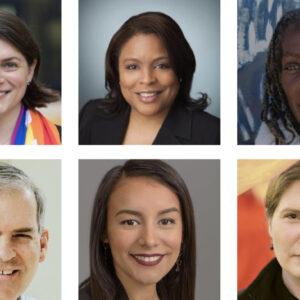

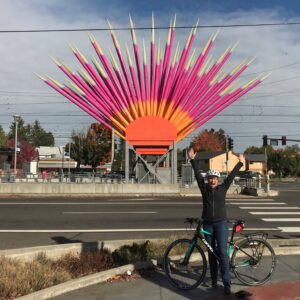
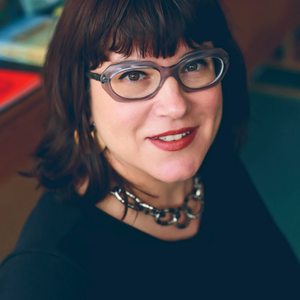
Thanks for reading.
BikePortland has served this community with independent community journalism since 2005. We rely on subscriptions from readers like you to survive. Your financial support is vital in keeping this valuable resource alive and well.
Please subscribe today to strengthen and expand our work.
So many of these candidates mention East Portland in their statements. I’d love to attend this, but living in East Portland, I don’t have time to ride to NW, take in the forum, and then ride back out east. :/
right! i had to drive to work, so i can drive home to take care of my dog, so i can drive to the event in NW. doesn’t seem right, does it?
Joann Hardesty’s platform includes police training and accountability, which is a transportation justice issue for people of color and disabled people riding bikes (as you yourself have covered on this site). Her platform also includes housing and climate issues, which are closely tied to bicycling. I think these are more substantively related to bicycle advocacy than, say, putting a picture of a bike on your site.
(I, personally, would tie police reform and housing–since proximity is so closely related to mobility– moer closely to bicycle advocacy than I would climate change issues, since impacts, not outcomes, are what drive behavior.)
Hi Esther,
I understand that. Maybe I didn’t make it clear, but this post was done as a very cursory primer to let folks know what these candidates say specifically about transportation on their websites. I regrettably have not taken the time to analyze and present their positions in a more in-depth way that would allow me to explain how, for instance, Hardesty’s platform of police accountability is related to transportation. I get that idea very clearly as you mention in your comment. Please don’t take the fact that I don’t directly point that out in this post as an illustration that I am unaware of how these issues intersect. Also, you know me well enough to know that I fully understand that transportation justice for non-white people is “more substantively related to bicycle advocacy” than a photo of a bike on a website.
I didn’t say you were unaware of anything – as you know, we have had many discussions about these topics! I was just pointing out that you did highlight her climate change platform, and that I thought that was less relevant to the others.
Also, Andrea Valderrama has a transpo platform: https://www.valderrama4pdx.com/issues
TRANSPORTATION
Commitment to Vision Zero and Increased Transportation Options to Eliminate Traffic-Related Deaths
Congestion Pricing to Reduce Traffic Jams
Safe Routes to School
Youth Pass
Investment in Mass Transit and Pedestrian / Bicycle infrastructure, Leading to Decreased Carbon Emissions and Livable, Walkable Neighborhoods
Thanks Esther. And I’m getting the post updated now. Valderrama only updated her site after this story was published!
It’s very disappointing that Hardesty’s platform doesn’t speak to transportation issues directly. I know there are many pressing issues in Portland, but a transportation platform should absolutely be on any prospective candidate’s website. It’s connected to so many of our priority issues, including inequities, as you pointed out. So why the void?
As she has been an ardent supporter of EPAP since its inception, might her viewpoint be the same as that of EPAP?
EPAP Transportation items: http://eastportlandactionplan.org/strategies/351
I think she knows the issues, and will be in line with EPAP, but I think every candidate should have something on their website. Two EPDX residents running and don’t have anything about what specifically they would do for EPDX? Odd.
Thanks for the vital info, JM.
Wow, this is quite the mess.
Hey Loretta, how are you going to address our maintenance backlog and expand transit after we spend $500 million on freeway expansion in the central city? More taxes?
Maybe because it is a different pot of money with different eligibility requirements? Oh, yeah. I forgot; it’s all government money or the people’s money or “those rules can be changed.”
In most US cities the money is generally pooled, taxes easily raised, and the rules are frequently changed. But you are right, not in Oregon and certainly not in Portland. I wonder, how many other people will drink the kool-aid and believe all the promises made tonight?
Part of the maintenance backlog is on ODOT owned roads in and around Portland, including I-5, so yes, it is the same pot of money. If the Portland leadership stood their ground and opposed the I-5 expansion, they could divert money to fix other ODOT roads in Portland, like 82nd, Powell, Sandy, etc.
100% Voting for JoAnn Hardesty for seat #3.
I also like Julia DeGraw for seat #2.
I’m planning on going to this event and looking forward to it, but I really really wish candidates would more specifics on the issues up on their websites. Most people who will be voting in this election don’t have the time and/or the inclination to go to candidate forums. It shouldn’t be so hard to find out what a candidate believes in (and what they think city council should be doing).
Loretta Smith says she supports the Rose Quarter freeway project but makes no mention of congestion pricing? Well . . .
Which of these candidates actually gets around by bicycle in their daily lives? I know Julia and Stuart do; any others?
I’d also be curious who uses transit.
UPDATE: After this story published, Valderrama updated her site with a listing of her transportation priorities:
I really want a candidate who walks the talk! – er, bikes the talk.
You should look into JoAnn Hardesty — she has a multi-decade record of speaking truth to power while also getting s#$t done. I’m to her left but I think JoAnn is quite possibly the most “anti-establishment” candidate this city has seen — a maverick in the best sense.
And if you want to disrupt the profound influence of money on politics in this city vote for the candidates who have eschewed large donations from corporations and wealthy people: JoAnn Hardesty, Julia DeGraw, and Maria Garcia (for Multco Comm).
Jonathan,
IMO, JoAnn Hardesty was given short-shrift here given her many years of foundational work on the Portland Just Energy Transition (https://350pdx.org/pjet-goes-public/) and her long track record of support for east PDX transportation equity that David Hampsten mentions above. Also, Julia DeGraw’s many years of experience as a kick-ass organizer in the environmental movement was glossed over.
Many of your readers ride bikes because they care about our shared environment and transportation equity so these issues are not peripheral.
Best,
Soren